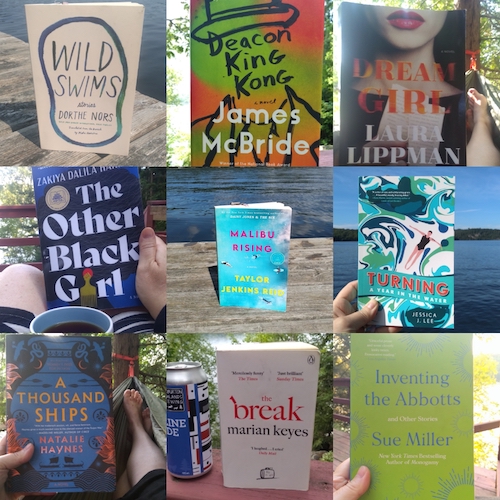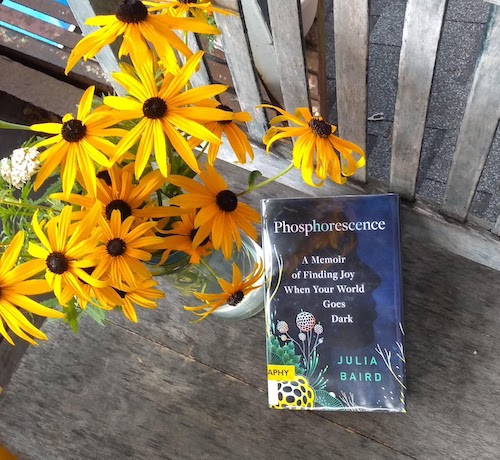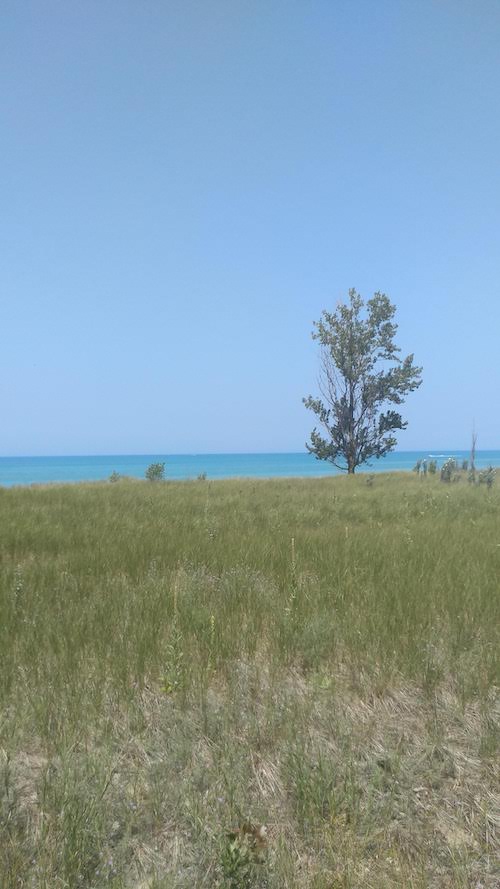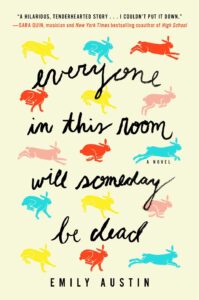August 23, 2021
Holiday Reading Part 2

There were no duds in this stack, and even the title I was most intimidated by (hello, novel about the Trojan War!) blew me away. Every single one of these very different books was an absolute stunner, and the connections between them (as always!) were fascinating—see chart below. I was also so happy to reread Turning, which I’d read on vacation three or so years ago, and which I enjoyed but found so SPECIFIC that I wasn’t quite sure it would resonate again, so I gave it away, which I regretted for years. A new copy found its way back into my life this year, however, so I was happy to read it again. By a lake, of course.
I LOVED Malibu Rising—while I liked her previous novel, it didn’t quite live up to the hype for me. This one, however, was amazing. Every Sue Miller book I read is a pleasure. The Laura Lippman book was the most wonderful mindfuck, as was The Other Black Girl, both of which take on writing and publishing. Happy to read my second Marian Keyes—she’s really so good. A Thousand Ships was incredible, and Stuart and Harriet both devoured it after I did. Wild Swims was weird, but neat, and short, which is just the kind of portion I can take my weird in.
And finally Deacon King Kong, which I heard of somewhere, and then found in a Little Free Library shortly thereafter. It was rollicking, kaleidoscopic, huge in its scope, and tragicomic brilliance. Absolutely amazing.

August 13, 2021
Steadily Outward

“After all this exploring, we should be gazing steadily outward, beginning to find others again, and the brilliance of the world outside our doors.” —Julia Baird, Phosphorescence: A Memoir of Finding Joy When Your World Goes Dark
(I loved this book so much!)
August 13, 2021
The Path Forward

Pandemics end, as history has shown us, but the other thing that history has shown us is that they do tend to go on for a while before that. This is in their nature, such a formidable foe that we can’t simply put down their persistence to bad government policy or even poor public health policy. Even with great policy and robust public health measures, the pandemic would continue, a problem without an immediate solution, and that’s before we factor in those people who are challenging/undermining public health measures, spreading misinformation, and “just asking questions” that make us much more vulnerable as a community than we necessarily have to be. While it feels better sometimes to have people to rage against, someone to blame (and there sure are people whose actions have made everything so much more awful!), it doesn’t really change anything about where we’re at.
I’ve been observing the ups and downs of pandemic life over the last year and half, which are indeed a reflection of case counts, but the waves I’m thinking about are more emotional ones. It felt pretty fantastic to be in Ontario in June with the city returning to life, with LIFE returning to life, to see friends and family and experience something close to normalcy. This summer has been glorious, which is just what I was hoping for as it was so hard to drag ourselves through a rather dismal spring of field hospitals and virtual school. Last summer was also pretty grand, and this is what I’ve tried to keep in mind as we ride the pandemic roller coaster—that nothing lasts forever, for better or for worse. All of us who kept going toward that light at the end of the tunnel, and for the last six weeks we’ve been bathing in it. There is a point to persisting.
And now it looks like we’re heading back into the tunnel again—and anyone who’s been paying attention to the UK and US should have seen this coming.
But it’s not the same tunnel—you know that, right?
In a few ways, it’s definitely a shitty tunnel, it’s true. A highly contagious variant that disrupts many of the things we’ve come to take for granted about Covid and what’s safe to do. But in so many more ways we’re in such a better place—so many of us did the right thing and went out and got vaccinated (which meant that those people who aren’t able to be vaccinated—including my 8 year old—are safer). While vax rates have fallen off (I wish news media would quit comparing rates to that ONE DAY when Toronto set a world record and vaccinated 27,000 people—not a fair measure!), more people are still getting their shots ALL THE TIME and people are coming up with all kinds of creative ways to reach those who haven’t had access yet. And while so many Twitter epidemiologists are still flexing their egos and (seriously!) because VERY OBNOXIOUS, scientists know more about Covid than they ever have. We’ve come such a long long way. Even better—think of what it means that 72% of Ontarians are vaccinated, and how this undermines all kinds of common narratives perpetuated by grifting quacks. In this way, so many of us really have been all in it together, and that’s amazing and powerful.
We’ve also made it this far and learned a lot in the process about how to take care of ourselves and and each other. Mask-wearing is unremarkable now. Outdoor gatherings are the norm. Most people aren’t washing their bananas in Lysol anymore. Handwashing is a habit. Sanitizer is everywhere. And all of this matters. (Even the Lysol! Because washing your food with Lysol is NOT GREAT!).
One thing I’ve learned is that I really was too cautious in isolating myself and my family from others. My kids were in school, so the stakes seemed high (and they were) but I think I went too far in SAFE direction, taking measures that really didn’t have any measurable effect in the end. I’m not going to do that again. I’m going to continue to see people outside if they’re vaccinated. I am going to do my best to live my life as fully as possible within the parameters of sense. I don’t have to be a martyr. I don’t have to get frustrated at people who are making different choices than me (because it really doesn’t help anyone if I do).
Another thing I’ve learned in the last year that’s proven essential is the importance of CHILLING OUT. When my kids went back to school last September, I quit Twitter and cut out numerous voices who were making an anxious situation even worse. I try not to think so much about the big picture, because the big picture is overwhelming but also I’m not in charge of the big picture, nobody pays me to look over all of society, and so I just have this little patch that I’m responsible for and I’m doing the best I can.
As @yellowmanteau has written so gently and perfectly, limiting your Covid intake is advisable. I read just a handful of news sources (and one of them is my Guardian Weekly magazine, whose latest cover is all about the UK emerging from its latest wave, which is a wonderful forecast of the future). I only check the numbers when reading them makes me feel good.
I also recommend reading the article by Ed Yong in The Atlantic on the new route out of Covid now that Delta has made everything harder (and the path longer). @science.sam shared it in her stories and it’s a clarifying view of the path forward, affirming what @science.sam has been saying all along (and saving my sanity in the process) which is ALL PANDEMICS END.
We’ll get there. Keep going! You’re doing it. (Unless you haven’t been vaccinated yet: go do that.)
August 6, 2021
Everyone in this Room Will Someday Be Dead, by Emily Austin
I will confess to having very little interest in all the sad, languishing literary heroines, the kind who embark upon years of rest and relaxation, spending entire chapters imagining what it might be like to have a job, asking such questions as, “How should a person be?” These literary people are just not to my taste, and so I was wary of Emily Austin’s debut novel, Everyone In This Room Will Someday Be Dead, about Gilda, who is overwhelmed by depression. And also a lesbian atheist who accidentally gets hired as a receptionist at a Catholic Church, and Gilda deals with this complication as head-on as she tackles everything in her life, which is to say: not at all. There’s also the mystery of her predecessor, an elderly woman whose death was suspicious. And the question of how many dirty dishes she can store in her closet before she’s forced to run some water in the sink.
I loved this book, which is very much internal, but where all the sad, languishing literary heroines are impossible company, Gilda is delightful. Her point of view entirely sympathetic, and the reader begins to cheer for the ER staff who receive her with tenderness as she arrives again and again with issues relating to anxiety. The whole narrative gets a little too madcap and threatens to go off the rail in places, but it holds steady, as Gilda doesn’t, and her despair has real resonance, her grappling with meaninglessness so meaningful, and yes, this is a book that ends with hope, which is definitely why I like it so much. But it’s also a really compelling depiction of the experience of mental illness, which was important to Austin, she writes, so that some readers will finally see themselves and that others might finally understand.
July 30, 2021
Summerlong

Summer continues! We had a lovely long weekend on Lake Huron recently, and I brought ATTACHMENTS, the first novel by Rainbow Rowell, and loved it so much. I’d had a rough week before we’d headed out of town and so even though I’ve gathered a pile of newly-released thrillers, I knew I wanted something more cheerful. The Rainbow Rowell book was not immediately appealing, however, because I’d found it in a Little Free Library and someone had spilled water on it once upon a time, but it turned out to be perfect, and now I keep recommending it to everyone. Such a great book that manages to be about work and friendship AND a romance all at once. It definitely brought back memories of nascent online culture in the workplace circa 1999/2000. Remember when your emails used to get flagged for using certain language? I worked in an office once where I inadvertently downloaded something that turned my cursor into a fairy wand, and somehow the IT guy knew immediately, and it was very embarrassing, and we didn’t end up dating, but they do in the scene from my next novel that I created out of this situation.
July 19, 2021
Getaway

How I spent my summer vacation! So nice to read such an eclectic selection of fiction.
The Final Revival of Opal and Nev is one of the most hyped books of the season, and I really liked it. A fictional oral history of a 1970s’ pop act, it’s also a fascinating treatment of how race and gender can eclipse talent, and a withering indictment of white allyship.
I picked up Picnic at Hanging Rock after it was included on the Topaz Literary Summer Reading Round-Up, and I am so glad I did, because indeed it’s a sultry, languid read, weird and disturbing, the story of the unsolved disappearance of three school girls in turn-of-the-century Australia.
Single Carefree Mellow was everything I was hoping for in a Katherine Heiny book, so sparkling and weird, and definitely a riff on Laurie Colwin who knew better than to assume that love and infidelity were interchangeable, because real life is more messy and complicated. The only problem is that now I’ve read all her books, and so she has to publish another one pronto
I read Burnt Sugar next, by Avni Doshi, so unrelentingly bleak, kind of holding up a magnifying glass to its characters so we could see ever errant hair and enlarged pore, and there was so much ugliness. I didn’t like it, but that’s not to say it wasn’t really good.
And then I read Long Live the Post Horn next, by Vigdis Hjorth, and wasn’t crazy about it initially. I am allergic to the works of Ottessa Mosfegh, and this was kind of similar in the beginning, not far from the bleakness of Burnt Sugar, with characters numb and detached, but then it clicked for me, mostly because it’s about hope and the postal system, which is definitely my jam. And I don’t think I’ve ever read a Norwegian novel before.
After that: Maeve Binchy! I read Circle of Friends years ago when I was a teenager who cut out pictures of Chris O’Donnell from magazines and hung them on my wall, but never read anything else, deciding that Binchy was for biddies, but for the last few months I’ve been listening to the You’re Booked podcast and they talk about her all the time, and so when I found Light a Penny Candle in a Little Free Library, I brought it home, and it was delightful, which I don’t say about most books more than 800 pages long, and it only became COMPLETELY ridiculous in the last few chapters, which is pretty impressive. A really wonderful look at friendship, and also of women who are allowed to be different and now just foils.
And finally, Astra, by Cedar Bowers, which I started on the last night of our trip, a novel in pieces, and I am waiting until I get to the end of give my assessment, but maybe smart people are saying many good things about this book.
July 9, 2021
The Fourth Child, by Jessica Winter
I could not love the cover of this book more, at first glance one of those abstract artful prints that have been splashing over literary novels in recent years but, upon rotation, the picture becomes a landscape, a suburban streetscape complete with a picket fence, and the whole novel is a little bit like that, art and realism, something different every way you look depending on your point of view.
Jessica Winter’s The Fourth Child is a novel about abortion and motherhood, but to say such a thing is far too reductive, because this is a book far richer than merely what it’s “about.” Instead of about, it’s a world conjured, decades of history, layers upon layers of meaning, and it begins with Jane, a fervent Catholic schoolgirl who becomes pregnant and marries her boyfriend. Going on to have three more children, and a less than satisfying marriage, and when her eldest daughter Lauren comes of age, she takes on a share of the narrative, consumed with high school social dynamics, Jane existing on her periphery, consumed with her local right-to-life group. But then this arrangement is shattered with Jane brings home an orphan from Romania, a disruptive toddler who’s somehow Lauren’s sister now, and the extent of her attachment trouble sends each member of this already fragile family to the end of their tether.
But also Lauren is not a satellite, her story the effect of Jane’s cause, because she’s on her own collision course, and that a daughter can be a part of you and also her own separate universe at once is the confounding paradox of parenthood. Which only makes each character’s story richer and more complicated, of course—that our mothers and daughters don’t exist for our own purposes, and here they come along, messing up. And I think it’s the seeming randomness of the novel’s many elements that underlined its artfulness to me, enhancing the texture, the way that all the pieces don’t just lock into place, because they don’t in the world. The years passing by with culture happening in the background—Buffalo makes a curiously compelling setting here, a player called O.J. Simpson playing for the local sports team, and it’s like we can see the 1990s coming. (The Fourth Child reminded me a lot of Ben Lerner’s Topeka, the way it traces so many of our current cultural divisions back to the 1990s, when all the players were stepping into formation.)
I adored the way that The Fourth Child complicated binaries, sat comfortably with paradox, and not only dared to show the many “sides” of the abortion debate, but to suggest it’s not a debate, but life itself, in all its painful, messy splendour.
July 7, 2021
Grinding Sharpening

For years, the knife sharpening van has existed on the margins of my experience, an uncanny ringing in the distance, slowly moving up and down the streets of our neighbourhood, slightly sinister. The idea of waving him down with a handful of knives always seemed awkward to me, and so I never have, and so all of our knives are dull dull dull.
The knife sharpening van makes a cameo appearance in my first novel, Mitzi Bytes, underlining the danger inherent in ordinary lives.
We were having a conversation about the knife sharpening van, its elusiveness, and our dull kitchen knives as recently as yesterday.
And then tonight we heard the tell tale clang clang clang, and ran out the door, knife wielding maniacs. “Stop, stop!” And he did!!
WE CAUGHT THE KNIFE SHARPENING VAN.
And it did not even open up a portal to another dimension.
It did, however, generate considerable sparks.
And someone is likely to slice open their hand in our kitchen within the next few days.
It was really and truly magic.
July 6, 2021
Gleanings

- Some mornings I sit at my desk and open A Writer’s Diary as a kind of divination. What was Virginia Woolf thinking nearly a hundred years ago, or eighty?
- This wasn’t the first time I’ve eaten in a restaurant alone, and I’ve never been self-conscious about it, but this time I was, and I think it’s because in fact, I now mostly eat alone.
- It was the best kind of rejection—personal, encouraging. It was handwritten for Pete’s sake. I was so mad at myself. I should have framed it. Instead, I lost years. It took me until my 30’s to unravel all of those toxic stereotypes about artistic genius and understand that what matters is doing the work and being willing to put it out there.
- I’ve gathered some stardust into a novel, flawed and imperfect though it is, and I hope to be able to share it with you someday.
- I need to make a list of things that I’m not going to do. And feel contentment seep in, with the release of the niggling feeling that I should be doing these things.
- Something opened up in me as I began swimming, and I remembered what I’ve always known—that I am most myself when I’m swimming. I started being able to think again.
- I thought Whereabouts really beautifully captured the paradox that isolation is not, or at least not only, about being alone.
- Think of a letter as a tack on a chair. You might pick one off, and ignore it. But next time, you’ll look twice before you sit down.
- Like many teens, summer was (is) a time to earn some money during the day and hang out with my friends on the weekends and evenings, spending our earnings on trips to the mall, bottles of Clearly Canadian, and coke slurpees. But my first summer job, ended up including a course of antibiotics.
- One evening last week the most awe-inspiring and spectacular sunset occurred.
- WHAT is this life if, full of care/ We have no time to stand and stare?—
- Sweat peas are one of my most favourite flowers. They’re so delicate. This is the season to stuff a jam jar full of them. Pinks! Lilacs! Scarlets!
- The point is, sometimes what was working fine doesn’t work so well anymore. Maybe it will again, someday, and maybe it won’t. The thing is, I want to be open to other options.
(Gleanings is going in summer holidays! Will be back at regular speed in September and maybe sooner here and there…)
July 5, 2021
Habits

In February, with infection rates rising, along with new variants whose increased transmission rates were still not understood, plus cold temperatures that made potentially infectious droplets hang in the atmosphere longer (and made face coverings very practical due to facts of chill), I got in the habit of wearing a mask every time I left my house.
This was especially important since I live in a densely populated area, and every trip down the sidewalk necessitated close encounters with my neighbours, because distance wasn’t always possible. And the shift to wearing a mask all the time was a deliberate and considered one. I’d been wearing a mask every time I took my kids to school and picked them up since September, but that was because I wanted to model this behaviour and take responsibility as the parent of children with the privilege of attending school in-person. I had resisted masking as a reflex, however, because it didn’t make sense from an infection control standpoint and also I don’t like being told what to do. I was going to wear my mask when it made sense to wear a mask—indoors and/or when I was in close proximity to others.
But in February, masking outdoors made some sense, and so I shifted my habits, and so it’s been ever since, but I’m trying to quit now. With infection rates falling in Ontario (170 cases today! There were more than 4000 daily cases in April…) and vaccine rates climbing (I am two-weeks past my second shot on Thursday!), masking to walk down the street seems less necessary, especially if I am keeping to less busy routes.
It’s too easy to become entrenched in one’s habits, which makes little sense in such a dynamic situation. But one’s habits become a comfort, of course, and can stand for security, and so it takes a bit of courage and thoughtfulness to keep evolving as everything else does, but I am determined to do so, so I don’t become that nutty woman yammering on at the Farmer’s Market about what Dr. Fauci was saying about masks in March 2020, if you know what I am saying.







